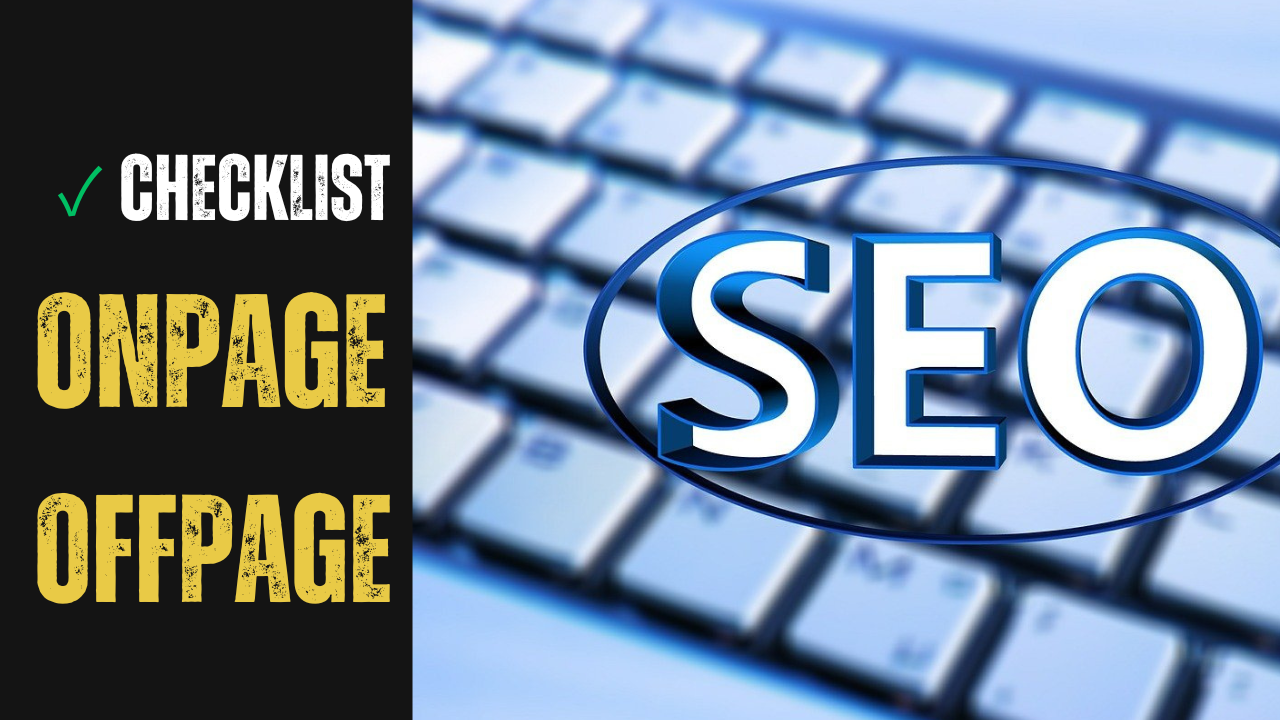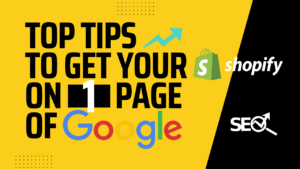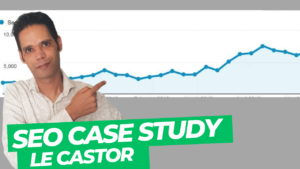
To be visible on search engine results pages, you are aware that you must optimize your website. While there are tweaks you can directly apply to your pages (technical and content), you also work on external factors (popularity). These combined optimization actions are what we call on-page and off-page SEO. I therefore suggest that you take a look at everything that needs to be put in place to promote your natural referencing.
What are the 2 main components of SEO optimization?
As you know, to improve the natural referencing of your site, you must implement concrete content marketing actions. To do this, you will work on the 2 main components of SEO optimization: “on-page” and “off-page”.
But what do these terms mean that you absolutely must know to be visible on search engines, especially Google?
1- Definition of the on-page SEO component
“On-page” SEO is the adjustments that you can make directly on your pages and your website. You have direct control over these actions, can adjust them as you see fit and update them whenever you want.
2- Definition of the off-page SEO component
“Off-page” SEO is the acquisition and optimization levers external to your website. Even though you can’t control everything that happens outside of your pages, you have the ability to optimize what you put in place.
The essential settings of on-page SEO
I invite you to discover in detail the on-page SEO optimizations that you must implement to improve your organic SEO.
Content
To be able to interest your reader and inform indexing robots of the relevance of your content, you must write quality texts that meet the search intent of Internet users. It is therefore the absolute priority for optimizing on-page SEO, and a way of proceeding that can be maintained over time. To do this, you particularly need to focus on the semantic optimization of your content.
Headings (H1, H2, H3, etc.)
The titles and subtitles of your internet pages have two SEO objectives:
- quickly inform your visitor about the content offered and capture their interest so that they spend more time on your page;
- improve your SEO by putting your keyword in an area widely considered by search engines.
To find out more about the SEO optimization of your titles, I invite you to read the following article: SEO H tags what are they ...?.
Metatitle (Title or H)
The metatitle is the title that appears on search engines (if Google has not decided to transform it) and in your browser tab. Once again, there is a dual objective in optimizing this on-page SEO element:
- highlight your content and make Googlers want to click on it;
- optimize another hot zone for your natural SEO.
To improve the SEO of your metatitle, I invite you to read the following article: The Title tag: best SEO practices.
Metadescription
The meta description is the text that appears on search engines below the title. Although it does not seem that this element has a direct impact on your SEO (a subject of debate among SEOs), it is nevertheless important for improving the click-through rate. Which therefore leads to an indirect influence on your SEO: the more Internet users choose your article in the SERP, the more search engines will estimate that it is a page that interests its users.
Further read : How to write the best metadescription ?
Image alt attribute
An indexing robot is not (yet?) capable of understanding the content of an image. This is why it is very important to enter your alt attribute!
Indeed, it will be read by search engines in order to realize the interest of the visual media proposed.
In addition, this information will be useful for visually impaired Internet users who will then be able to read this element. To optimize your alt attributes, I advise you to proceed as follows:
- use a maximum of ten words to precisely describe the image;
- add your query or keyword;
- provide geolocation information (if relevant).
URL
The choice of words in your URL is important for your organic SEO. We consider that Google, but also Bing or Yahoo, gives SEO “weight” to each word placed in your reticular address. So remember to reduce them as much as possible (avoid stop words, also called stop words) and place your main keyword there.
PLEASE NOTE: if your pages are already a few months old and are already indexed, it is strongly recommended not to change them! You can nevertheless apply this good on-page SEO practice to your future publications.
Essential web signals
Essential web signals, as the name suggests, are essential to optimize the on-page SEO of your site. These are mainly factors to take into account to be sure to offer a good user experience (UX) to your readership. Here are the 3 points to check to ensure that you respect the needs of Google and the Internet user:
- LCP: page loading performance;
- FID: reaction time after execution of an action;
- CLS: visual stability of your web pages.
Site speed
Google has been warning for years that the loading speed of your site is an important factor in your positioning on results pages. Even if this element does not turn out to have as much influence on your SEO, it seems that it must nevertheless be taken into account. Besides, isn’t it hateful to arrive on a page that takes several seconds to load?
To control your loading speed and know how to optimize your on-page SEO, I advise you to simply use the Google tool PageSpeed Insightshttps://pagespeed.web.dev
Mobile Compatibility
By monitoring the information contained in your Google Analytics, you will certainly notice that almost 60% of your visitors consult you from a mobile device (laptop or tablet). The proportion of these mobile users continues to increase year after year. This is why search engines have implemented a way to browse sites with priority on mobile versions (Mobile First).
Internal linking
The links that you add in your content have a very big influence on your SEO. Some SEO specialists even consider it to be an essential factor if you want to be well positioned in the SERP. The fact of offering pages complementary to the one browsed has two direct influences for your SEO:
- your visitors spend more time on your site;
- web crawlers easily crawl your pages.
Discover the crucial importance of this on-page SEO factor by reading this other article: Internal linking: the backbone of SEO.
Structured data
Adding structured data to your pages helps Google better understand their content. In addition, this can benefit your SEO if the queries worked lend themselves to the display of enriched results (rich snippets) on the SERP. This is particularly the case for the sale of products or services (the Google review rating is displayed), events and cooking recipes.
The most important levers of off-page SEO
Now let’s take a look at the off-page SEO optimization factors that you can implement and master in the long term.
External links
Implementing a netlinking strategy to obtain backlinks is an almost absolute necessity to improve your Google positioning. If authority sites in a topic related to yours recommend you by offering a link to your site, Google will think (rightly!) that you are offering trusted pages.
To discover a good way to optimize your off-page SEO, do not hesitate to read this content: How to Get High Quality Backlinks to increase SEO?
Social media
A link placed on social media will not be taken into account by search engines. However, this off-page SEO factor is important for your SEO! Indeed, if your content is widely shared and you have significant traffic peaks on your site, Google will consider that your pages are interesting and deserve to be displayed at the top of the SERP.
Mentions
Without linking to your site, the name of your brand appears on another page dealing with the same field? So, know that this is a positive element for search engines! In reality, it seems almost impossible that every time your name is mentioned there will be a hyperlink to your site. This proves that you are not in a mad rush for backlinks and will add value to this information.
Google My Business
This off-page SEO criterion has become essential today. Widely integrated into results pages, Google My Business (GMB) listings allow you to appear at the top of the SERP for relevant queries. In addition, they are very effective in Google Map searches, which represents a large volume of potential traffic.
On-page and Off-page SEO: which is more important?
Some will assure you that the creation of backlinks is the essential element to improve your SEO. On the other hand, others will tell you that only the content is essential. For my part, I am convinced that to succeed in your SEO, you must work on all the optimization areas that are at your disposal.
Indeed, these elements are fundamentally linked and, to succeed in being visible on the Internet, you should not do without one or the other. I see it as if we wanted to market a car. If you only build an engine and neglect to build a body and advertise, then you don’t have much hope of your business working…
Of course, the actions you take depend heavily on your means and capabilities. However, I remind you that there are more than 200 criteria taken into account by Google algorithms. It is true that not everyone has the same influence on your ranking. However, they are all worth considering for a chance of ranking first on search engine results pages.
Regardless, I consider that there is no point in optimizing off-page SEO before your on-page settings are perfect, or at least correct. If you have just launched your site or are starting your SEO strategy, I advise you to focus first on the most important criteria of your “on-page” optimization. Once this task is completed, you can then begin “off-page” optimization of your site.
You may also be interested in reading : 10 tips to rank a Shopify store on first page of Google
Conclusion
To carry out on-page SEO optimization, you must always think about the Internet user (first and foremost), then the indexing robots. When you optimize off-page SEO, you are mainly looking to improve your popularity (or notoriety) on the Web. By combining on-page and off-page SEO, you put all the chances on your side to increase your visibility on the Internet.
And you ? What actions have you already put in place? Are there other optimization elements that you apply that have allowed you to be in first position on Google?
The most important thing to acquire organic traffic is to respect the recommendations made by search engines, to understand the behavior of Internet users and to know how SEO algorithms work. To broaden your knowledge, I invite you to read this other blog post: Google reveals how its algorithm work





